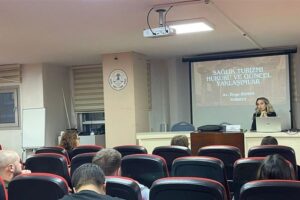Forough Zekavati 1 leila Andervazh 2 Soheila Zarinjoyalvar 3
Abstract
Health tourism is a new form of tourism and travel market organized with the aim of maintaining recovery or regaining physical and mental health, which has grown increasingly in recent years. This research was formed with the aim of the qualitative model of health tourism marketing and its effect on attracting tourism in health villages. Accordingly, in order to reach this pattern, the qualitative approach and the method of the theory arising from the data were used. The type of research in the model design stage, fundamental and in The model testing stage is practical. Qualitative content analysis and theoretical coding methods were used in the qualitative part and structural equations were used in the quantitative part. The data was collected by interviewing 11 experts and experts in relation to health tourism marketing based on the principle of saturation. In the first step, a total of 187 primary codes were identified, and based on the review conducted in this research, 101 primary codes were identified in the open coding stage, which were grouped into 29 conceptual codes. The findings showed Competitive advantage is a central category in health tourism marketing and its effect on attracting tourism in health villages, which is identified from the analysis of causal factors including amenities, introduction and advertising, environmental attractions, hotels and residential facilities, technology and advanced equipment, work experience, cost And economic efficiency, the special value of the urban brand has resulted.
Keywords: health tourism, tourism marketing, tourism attraction, health villages, data-driven theory.
To cite this article: Zekavati, F., Andervazh, L., & ZARINJOYALVAR, S. (2023). The qualitative model of health tourism marketing and its effect on tourism attraction in health villages; Based on Grounded Theory C. Journal of Tourism and Development. DOI: 10.22034/JTD.2023.382998.2731










